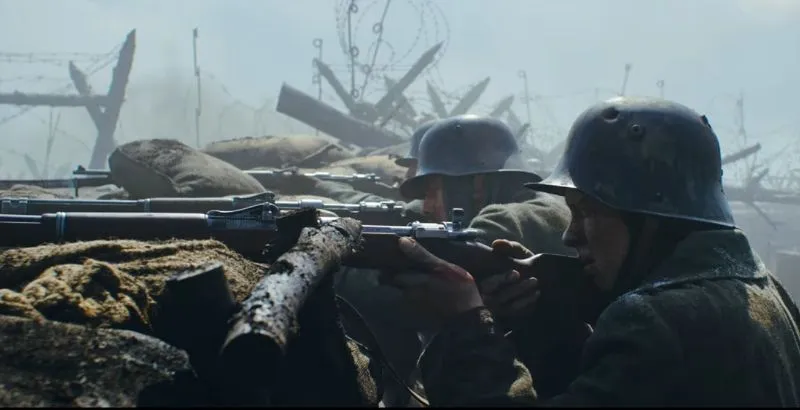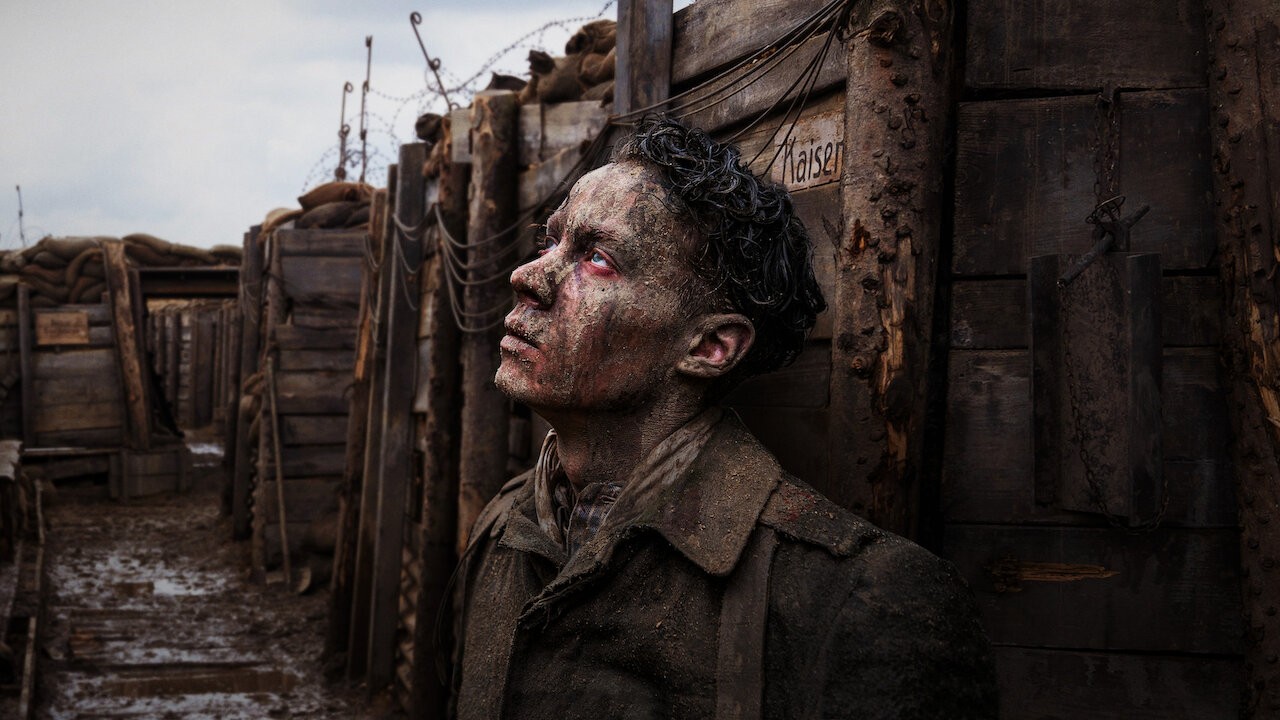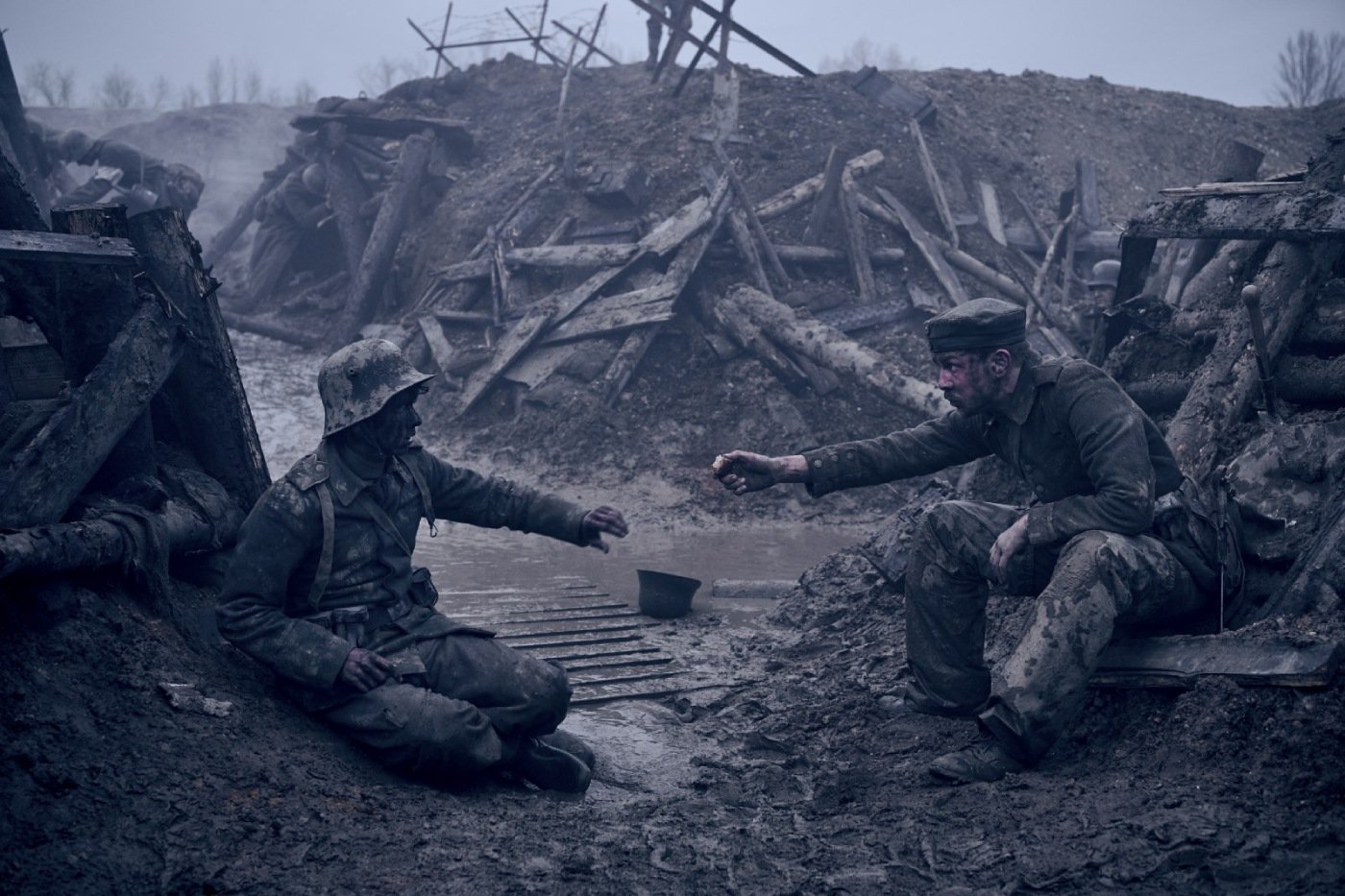All Quiet on the Western Front is a fitting ode to the anti-war sentiment of the novel upon which it is based. It utilizes violence and grit to formulate a treatise on the perils of armed conflict.
If there is one thing that is persistent about modern war movies, it is the emphasis to make sure audiences understand that war is hell. From Dunkirk to 1917, modern filmmakers have placed their audiences in hellish environments in order to evoke a feeling of fear, if not pity. Those films which still utilize war solely as an excuse for brainless action are taken less seriously than in the past, especially if they shrug off the horrors of war and boil it down to a simple nationalism-fueled conflict between the good guys and the bad guys. With modern technology and an emphasis on increased production values (thanks streaming services!) war is as detailed, tactile, emotionally challenging, and above all, realistic as it has ever been on the big screen.
All Quiet on the Western Front
Directed By: Edward Berger
Written By: Edward Berger, Ian Stokell, Lesley Paterson
Starring: Felix Kammerer, Albrecht Schuch, Daniel Bruhl
Release Date: October 28, 2022
All Quiet on the Western Front is a German adaptation of Erich Maria Remarque’s seminal novel of the same name. This is the third major cinematic adaptation of the novel, following the Best Picture-winning 1930 version and a 1979 television film. It will certainly be compared with Sam Mendes’ 1917 from 2019, which detailed the WWI conflict from the allied perspective, and set a precedent for modern films covering the conflict. WW1 has long been the forgotten war in the last half-century of mainstream cinema, but with the passing of its 100 year anniversary we have seen renewed interest with films like Wonder Woman, Tolkein, The Promise and The King’s Man.
All Quiet on the Western Front follows in the footsteps of more recent war films more so than the previous adaptations of the novel. Like 1917, it is sensory-obsessed. It is a spectacle film, drawing in the audience with harrowing action and incredible production. It is not a romanticized look at war, not obsessed with painting a story with well-developed characters, pride or prejudice. Instead it revels in the experience, championing in those fleeting moments of beautiful humanity within an unimaginably dark and depressing time.

I found the film to be less interested at being an adaptation of the novel, and more interested at using it to guide the central story. The film doesn’t bother to give us much of a backstory on any of the characters. We know next to nothing about their home lives except what they discuss with each other in those homesick interludes between battles. Critical moments of the book are left out completely, and others are distilled down to the basics and reworked within the intent of the film. In this way, the film doesn’t feel like it is treading on the tails of the highly-regarded 1930 version, nor does it quite feel like it is taking advantage of the novel and its name recognition.
The largest change between this new film, the novel, and previous adaptations is the addition of a secondary storyline that follows the diplomacy surrounding the signing of the armistice that ultimately ended the war. From the very beginning the film makes it apparent that Germany no longer wants to be a part of this war. Certainly the main characters are swept up in the nationalist propaganda and eager to join, but there is this impending sense of doom over everything. The film doesn’t bother to tempt us with the comforts of a domestic life. Even when one of the characters gets a chance to spend time with a woman, she is out of focus, in the distance.

This is perhaps the biggest contribution this film makes to the realm of historical war movies. It is less about championing the efforts required to win a war, and more about the efforts to try and stop one that is already in full swing. It helps that the film comes from a German perspective which never really glorifies the conflict in the first place. We get a high level and low level look at this effort at the same time. Those negotiating the armistice recognize the horrors the empire has committed and the terrible consequences facing the future. Those on the ground are nothing more than cannon fodder stuck surviving the disillusion of the previous generation. It’s more than just “war is hell” at the ground level, it’s about what we do in the face of certain defeat on all levels.
Still, the film spends most of its time at “ground level”, which is important because that provides the context for the secondary storyline regarding the diplomatic negotiations. In the trenches is where the film grabs you hostage. The filmmakers did a great job bringing the terrible conditions to life. Not only does the sound and movement strike home, but the cinematography and special effects really make it emotionally impactful. This is the most bloody and violent war film since the opening scene of Saving Private Ryan, and the battles unfold like they belong in a horror movie more so than epic action adventure.
The makeup and costume work in particular is quite spectacular – really nailing the details on everything from mud-soaked pants down to the stained teeth of the actors. The whole film feels like it is sopping wet and withered to the bone from exposure to the elements. Even when the film isn’t embedded in the trenches, it provides an impressive picture that never feels like the artistic flair comes at the expense of demonstrating the struggle in the situation. In both the quiet moments and the loud ones, the film never lets you lose the impending hopelessness. There’s a strong direction and commitment to the film’s overarching messages.

The acting is strong as well. I appreciated how the new recruits slowly became the veterans over the course of the film. If initially they were just thrown into the deep end, by the end of the film they have relegated themselves to the pain. The script doesn’t really give the actors a chance to develop the camaraderie between the group of friends, so there is a sense of emotional commitment to the characters which is lacking. The caveat is the film does get to cover a lot of ground, and it allows the split perspective mentioned earlier. I have mixed feelings about the trade-off.
All Quiet on the Western Front therefore excels in execution but does suffer a bit under the surface. It captures the novel’s efforts to realize the psychological trauma of the war, but doesn’t really attempt to follow the novel’s path to get there. The film is stark, menacing, and chilling, although its gritty action and sophisticated production can’t help but bring up connotations to 1917. This makes it feel less creative than it should have, which is a shame. Regardless, it is something that feels heavy, and places a burden on the viewer without giving them an excuse to look away. This is an important film, well made, and a compelling modernization of the classic, timeless original.

